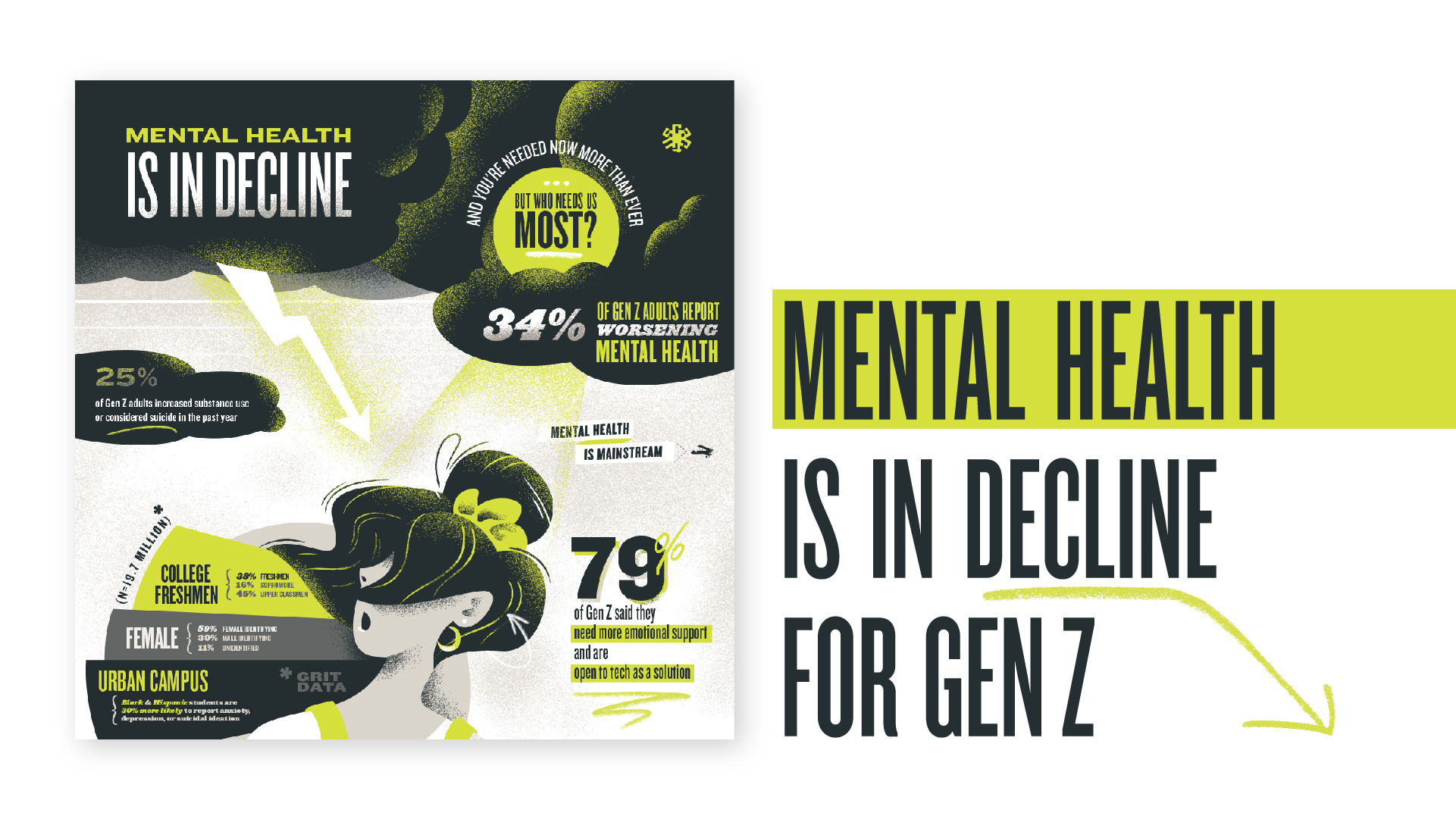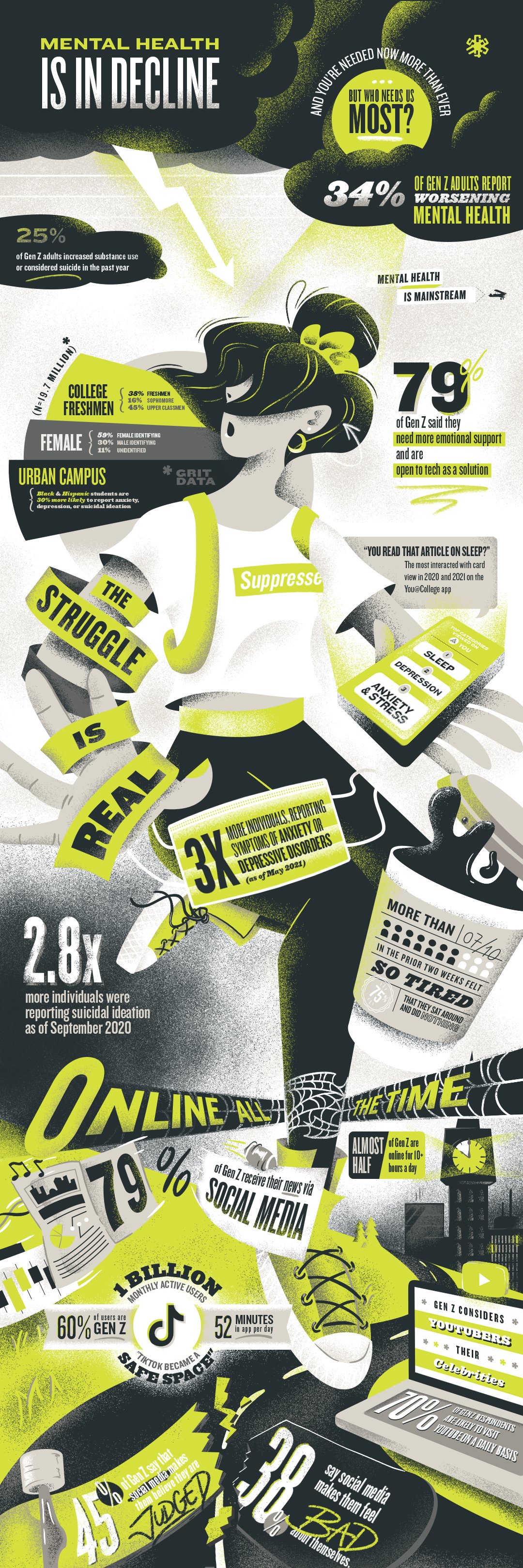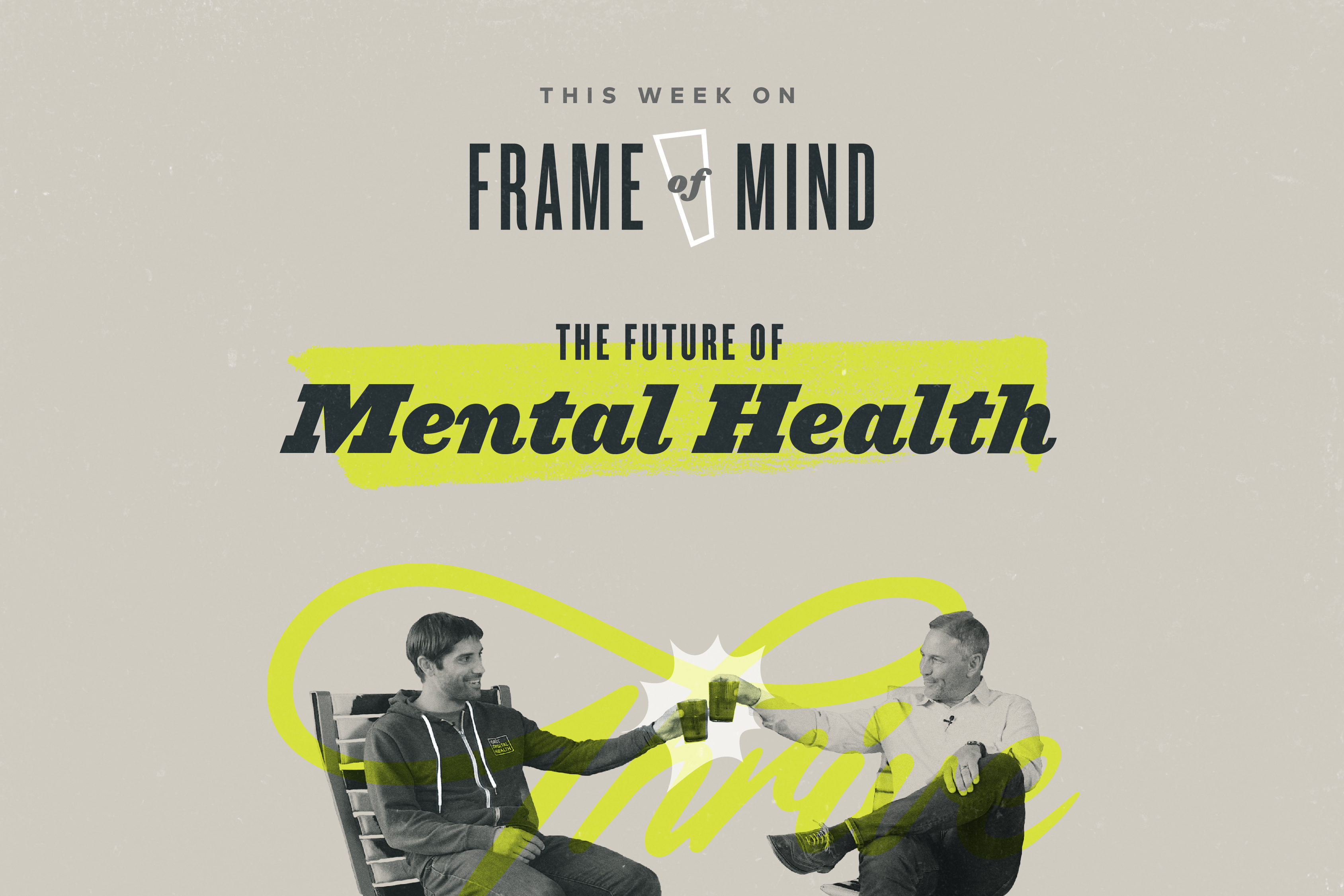
If there’s one silver lining to the past year, it’s that 2020 was the year mental health finally became part of the national conversation surrounding overall health. And as an agency that specializes in mental health and behavior change, we want to make sure it stays that way.
To better arm health-tech marketers, we partnered with our sister company, Grit Digital Health, to look at usage insights from their personalized mental wellbeing platform - YOU at College. The YOU platform is a customized digital portal being used on more than 180 campuses nationwide. It is designed to help students learn coping skills, stress management, and connects students to the right resources at the right time to address mental well-being challenges facing every college student.
These insights have helped to define who marketers should be trying to reach, the types of content users are seeking out most, and ultimately how you can meet them where they are.
WHO NEEDS YOU MOST
We all know that even the best marketing won’t work if you’re not getting in front of the right people. The key is zeroing in on the segments that are most receptive to receiving mental health services through technology.
In order to pinpoint who those people are, we dove into the usage analytics from Grit’s YOU at College app to understand the characteristics of users who were most engaged on the platform during the pandemic. That answer was clear; based on our data, female-identifying college freshmen at urban campuses were the so-called ‘power users.’ We dove even deeper to try and understand the college-aged Gen Z and the way they think about mental health. What we found was they are more open and accepting of help than any other generation before them. But, after the pandemic they are also feeling very down about their futures, and are turning to tech to find support.
The findings in this infographic detail the “power users" of YOU at College during the last year, including who they are and what makes them tick. You can think of them as an aspirational design target, the cohorts who are most in need of mental health tech services right now. To ensure product relevancy and maximize user engagement, build your product experiences with the needs groups in mind.
THE TYPES OF CONTENT THEY’RE READING
We wanted to really dig into the content categories that are rising to the top. What are the topics and resources for mental health that are most often clicked/sought out by these users?
Grit’s dataset from the YOU at College platform found that while students are searching for help in many areas, Sleep, Depression, and Anxiety and Stress are the most relevant.
Faced with the unprecedented stress and uncertainty of the past year, these were the content categories students most frequently accessed using the YOU platform.
HOW TO REACH THEM EFFECTIVELY
What is the best way to reach a college-aged audience? Where should you be sharing relevant content, and driving trial and engagement for your mental wellbeing platform?
The Cactus strategic comms team are experts at meeting consumers where they’re at with the right message, on the right channels, at the right moments of receptivity. They examined the media engagement habits of our YOU at College audience and found that while university students are adept at engaging with media across a vast array of channels, TikTok, YouTube, and Instagram are proving to be the most effective in terms of engaging with a message related to taking care of their mental health.
With those insights in hand, we created a comprehensive infographic, with specific user insights laddering up to the who, what, and how referenced above. By leveraging the beliefs people hold about their mental health and more importantly, how to get help, we can create long-term sustained behavior that connects people to resources to help them thrive.
See the full insights on the infographic below.

Sources
“The Ultimate Guide to Marketing to Gen Z”. Campaign Monitor, https://www.campaignmonitor.com/resources/infographics/the-ultimate-guide-to-marketing-to-gen-z/.
“Stress in America 2021: One Year Later, A New Wave of Pandemic Health Concerns: Young Americans Continue to Struggle. American Psychological Association, 11 March 2021, https://www.apa.org/news/press/releases/stress/2021/one-year-pandemic-stress-youth.
“The Deloitte Global 2021 Millennial and Gen Z Survey.” Deloitte, https://www2.deloitte.com/global/en/pages/about-deloitte/articles/millennialsurvey.html.
Watson, Amy. “Gen Z News Consumption Sources in the U.S. 2021.” Statista, 10 June 2021,
https://www.statista.com/statistics/1124119/gen-z-news-consumption-us/.
Greene, Grace. “TikTok, Gen Z, and Mental Health.” Hope Lab, 17 March 2021, https://hopelab.org/insight/tik-tok-gen-z-mental-health/.
Vatere, Benoit. “Generation Z: What Media Means to Them and How They Consume It.” Medium, 8 April 2020, https://medium.com/swlh/generation-z-what-media-means-to-them-and-how-they-consume-it-c8c57c302f6c.
“Generation Z Media Consumption Habits: True Digital Natives”. Trifecta Research,
Westcott, Kevin, et al. “Digital Media Trends, 15th Edition.” Deloitte Insights, Deloitte, 7 May 2021, https://www2.deloitte.com/us/en/insights/industry/technology/digital-media-trends-consumption-habits-survey/summary.html.
Lu, Marcus. “How Media Consumption Evolved Throughout COVID-19.” Visual Capitalist, 22 June 2021, https://www.visualcapitalist.com/how-media-consumption-evolved-throughout-covid-19/.
Alkhouri, Dana. “Pandemic’s Mental Health Burden Heaviest Among Young Adults: In a Recent Survey, Almost Two-Thirds of 18-to-24-year-olds Reported Symptoms.” Abc News, 21 February 2021, https://abcnews.go.com/Health/pandemics-mental-health-burden-heaviest-young-adults/story?id=75811308.
“Gen Z: What’s Causing This Generation’s Stress?” Rescue Mental Health & Addiction Services, Inc, 2 July 2019, https://www.rescuemhs.com/gen-z-whats-causing-this-generations-stress/.
“Mental Health, Substance Use, and Suicidal Ideation During the COVID-19 Pandemic - United States, June 24-30, 2020.” Centers for Disease Control and Prevention, Centers for Disease Control and Prevention, 13 August 2020, https://www.cdc.gov/mmwr/volumes/69/wr/mm6932a1.htm.
Lumpkin, Lauren. “A Mental Health Crisis Was Spreading on College Campuses. The Pandemic has Made It Worse: Students at four schools reflect on the isolation, anxiety and trauma of the last year”. The Washington Post, 30 March 2021,
https://www.washingtonpost.com/education/2021/03/30/college-students-mental-health-pandemic/.
Son, Changwon, et al. “Effects of COVID-19 on College Students' Mental Health in the United States: Interview Survey Study.” Journal of Medical Internet Research, JMIR Publications, 3 Sept. 2020, https://www.ncbi.nlm.nih.gov/pmc/articles/PMC7473764/.
Duffin, Erin. “U.S. Number of College Students 1965-2020.” Statista, 2 June 2021, https://www.statista.com/statistics/183995/us-college-enrollment-and-projections-in-public-and-private-institutions/.
Amour, Madeline. “Suicidal Ideation on the Rise for College-Aged Adults Due to COVID-19 Pandemic”. Inside Higher Ed, 17 August 2020,
Anderson, Greta. “Students Reporting Depression and Anxiety at Higher Rates”. Inside Higher Ed, 19 August 2020,
Redden, Elizabeth. “Pandemic Hurts Student Mental Health”. Inside Higher Ed, 13 July 2020,
Son, Changwon, et al. “Effects of COVID-19 on College Students' Mental Health in the United States: Interview Survey Study.” Journal of Medical Internet Research, JMIR Publications, 3 September 2020, https://www.ncbi.nlm.nih.gov/pmc/articles/PMC7473764/.
“The Future of Telehealth in the U.S. and Across the Globe.” InTouch Health, 19 March 2020, https://intouchhealth.com/future-telehealth-us-across-globe/#:~:text=The%20market%20is%20expected%20to,way%20providers%20treat%20their%20patients.
“Stress in America 2020 Survey Signals a Growing National Mental Health Crisis.” American Psychological Association, American Psychological Association, https://www.apa.org/news/press/releases/2020/10/stress-mental-health-crisis.
Horizon Blue Cross Blue Shield of New Jersey. Anxious and Depressed, Millennials and Gen Z Need Help. This Is How to Support Them., Horizon Blue Cross Blue Shield of New Jersey, 4 May 2021, https://www.horizonhealthnews.com/anxious-and-depressed-millennials-and-gen-z-need-help-this-is-how-to-support-them/.



